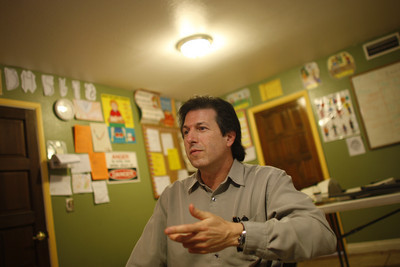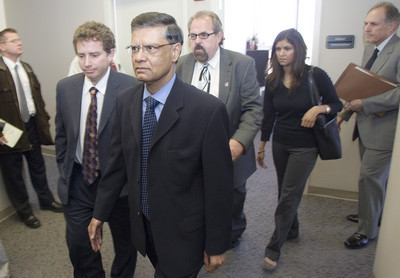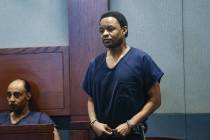Desai’s examiner raises doubts
Thomas Kinsora did what he said was a thorough and fair neuropsychological evaluation of Dr. Dipak Desai, coming to the conclusion earlier this month that the brain injury impairment caused by a July stroke makes Desai currently incapable of assisting in his defense against malpractice charges.
But last week Kinsora, who believes other medical tests must be done to ensure an accurate assessment of the physician's long-term condition, wondered if he was the best route for the Nevada Board of Medical Examiners to take in the case involving Desai, the practitioner at the center of a hepatitis C outbreak.
"It would have been better if the board had this done out of state, because so many people are cynical about corruption among the medical community" in Nevada, Kinsora said. "And it would have been much better if the process for this getting done wasn't some kind of secret ... and more multidisciplinary in scope."
The board already has suffered from conflict of interest issues, Kinsora noted.
Because Drs. Javaid Anwar, Sohail Anjum and Daniel McBride were either friends or business associates of Desai, Gov. Jim Gibbons asked them to resign from the board. They refused that request, but they recused themselves from inquiries into Desai or his clinics.
Louis Ling, executive director of the medical board, said Friday it is difficult for him to see how the selection of Kinsora is a bad choice.
"The fact we chose someone in the community is probably the way to make sure it's done the quickest," Ling said. "He (Kinsora) didn't know Dr. Desai, and the parties believe he did a good job.
"That's all we have a right to expect here. ... I think there's very little we can do about cynicism in the community."
Ling said Desai could have been sent out of state, but "that would have taken considerably longer than what's in place. ... There's a tremendous amount of pressure on this board to get something done."
Kinsora said he wasn't hired by the board.
"A neurologist called me and asked me to do a referral and to send the results to the board. I was never asked if I knew Desai, which I didn't. I'd like to know myself how they decided on me."
Kinsora said even though he disagrees with how the evaluation is being done, his decision to take the case wasn't influenced by money. He said his reimbursement will be less than what Medicare pays him for seeing elderly patients.
"I take complex cases for their challenge and intrinsic interest, and I believe I had a public duty to try and see that this case is handled as well as can be under the circumstances," he said.
Las Vegas neurologist Dr. Morton Hyson, who said Desai is not his patient, said it is common and prudent for neurologists and neuropsychologists to collaborate on an evaluation that may include specialists ranging from speech and language therapists to occupational and physical therapists.
"Each brings something important to the table," Hyson said.
While a neurologist M.D. deals with the structural and physiological consequences of organic brain disease and brain injury, the neuropsychologist Ph.D. probes the cognitive and behavioral impact of such conditions.
Both Kinsora and Hyson said it is possible that a neurologist and neuropsychologist could come to differing conclusions on the same patient if they didn't have input from the other's expertise.
A stroke occurs when a blood vessel bringing oxygen and blood to the brain ruptures or gets blocked so brain cells don't get the flow they need. Brain scans can detect which portion of the brain is injured, giving indications of how individuals will be affected.
"Yet," Kinsora said, "a neurologist would make an error, for example, if he were to look over a radiologist's report that shows right hemisphere damage in the brain and automatically think an individual was going to have a memory and attention problem. The person has to be tested. I've tested people with tumors who can still function fine."
Deputy Clark County District Attorney Scott Mitchell has said a medical expert who examined the 58-year-old Desai's brain scans for law enforcement did not find evidence of residual effects from the stroke that would make Desai unable to participate in his criminal defense.
Kinsora said neuropsychologists believe their battery of tests do not allow a highly educated individual, including medical doctors familiar with how a stroke can affect behavior, to fake a condition.
After Desai suffered an earlier stroke in 2007, plaintiff's lawyers in a malpractice case trying to get the physician's deposition questioned how badly he had been affected. While Desai's lawyers argued that he could testify only briefly because of the stress, Desai had resumed performing surgery weeks earlier.
"Those who say that one might easily fake a well-constructed neuropsychological battery of tests are simply wrong," Kinsora said.
Numerous scientific studies have demonstrated the validity of tests designed to detect deliberate faking, and results of neuropsychological tests are routinely used in the nation's court system.
Kinsora acknowledged that becoming involved in a case in which interest is so high has made him realize how important it is for the public to gain a clear picture of how authorities deal with critical situations.
"The process of how physician impairment is dealt with should not be a secret," he said. "Of course, we have to protect an individual's rights, but we have to know how situations are handled. Lives can be at stake." Ling said respect for Desai's privacy, not secrecy, is the reason the selection process was handled as it was.
"We have to remember that Dr. Desai is still a human being," he said.
Ling would not comment specifically on how Kinsora was selected.
As he sat inside the Nevada Children's Center that he helped found, a nonprofit agency that treats children with severe behavior problems, the 49-year-old Kinsora said privacy statutes keep him from talking specifically about Desai's case, and from revealing the name of the neurologist who contacted him about testing Desai.
Kinsora said, however, that when he has consulted on physician impairment cases in the past, the neurologist who contacts him is the patient's physician, who asks him to send a report to the board.
Ling said after Desai's evaluation became public he was sure Kinsora had been screened for any possible relationship to Desai, but he doesn't know how. Kinsora said he would never perform an independent medical evaluation on someone he knew "because of professional ethics." He said he has never been aware of any collusion by medical professionals writing evaluations in Las Vegas.
But, he said, "a multidisciplinary approach involving a variety of specialists working together would be much better in assessing an impairment."
That would involve sending the evaluee to an academic medical center to be examined by experts that may include a neurologist, neuropsychologist, physical therapist, occupational therapist, and speech and language pathologists.
Those professionals often get together and write a report that shows how impairment affects an individual physically, mentally, psychologically and emotionally, he said.
As it stands now, Kinsora believes the board receives individual reports from specialists who do not pull together a complete picture of an individual, leaving it to board members to piece assessments together.
Ling said the board gets few physician impairment cases and each one must be dealt with uniquely. "I don't know that it makes sense to set up a process when we're talking about such unique cases, whether they're about substance abuse or competency."
Randal Manning, executive director of the Maine Board of Licensure in Medicine, said last week that his board favors the multidisciplinary approach when dealing with doctors with problems because it is more comprehensive. He noted that a physician who suffered a stroke in his state was sent to Rush University Medical Center in Illinois for testing.
"Boards are made aware of where physicians can be sent for a variety of comprehensive evaluations," Manning said, adding that his board has sent doctors out of state for work-ups to allay any public concern about bias.
Drew Carlson, a spokesman for The Federation of State Medical Boards, a nonprofit that represents the 70 medical boards of the United States, said the organization makes available to state boards a list of centers where physicians can be evaluated for everything from substance abuse problems to competency questions.
Las Vegas police, the FBI, the IRS and the state attorney general's office have investigations under way involving Desai. Health officials have linked nine hepatitis cases to his clinics and more than 100 others have been "possibly" linked.
Kinsora's evaluation of Desai came nearly nine months after his stroke. A summation of his findings are in an April 15 report to the board by hearing officer Patrick Dolan, who is assigned to Desai's malpractice case.
Dolan's summation noted Desai "would have difficulty assisting counsel currently" on his malpractice case. Dolan also wrote that Kinsora concluded that "in order to determine the extent and severity of the damage caused by the stroke he needed to access and evaluate additional medical records."
Though Dolan ordered the tests done, Kinsora isn't sure he will have access to them for further assessment.
"I don't think I'm supposed to play any more role in this," Kinsora said. "If I am, I haven't heard about it."
According to Dolan's order, additional test results and recommendations should be forwarded to legal counsel and the hearing officer.
"The way I understand it," Ling said, "is that Dr. Kinsora will get the results of the additional tests and then he will write a recommendation. We'll have to clear that up. We still have time."
Dolan said he would not comment beyond his order.
Ling said even if Desai is found competent to assist in his malpractice defense, people should not think the hearing on his license will move forward quickly.
"As long as there is a criminal case out there, you can expect him to invoke the Fifth Amendment in a hearing," Ling said. "There's nothing wrong with that, of course; it's perfectly legitimate, but it's why we can't get this done. It's very frustrating to the public."
In his report, Dolan said a July 14 status conference should be held on Desai's prognosis and diagnosis as it relates to the malpractice case.
Contact reporter Paul Harasim at pharasim@reviewjournal.com or 702-387-2908.
























